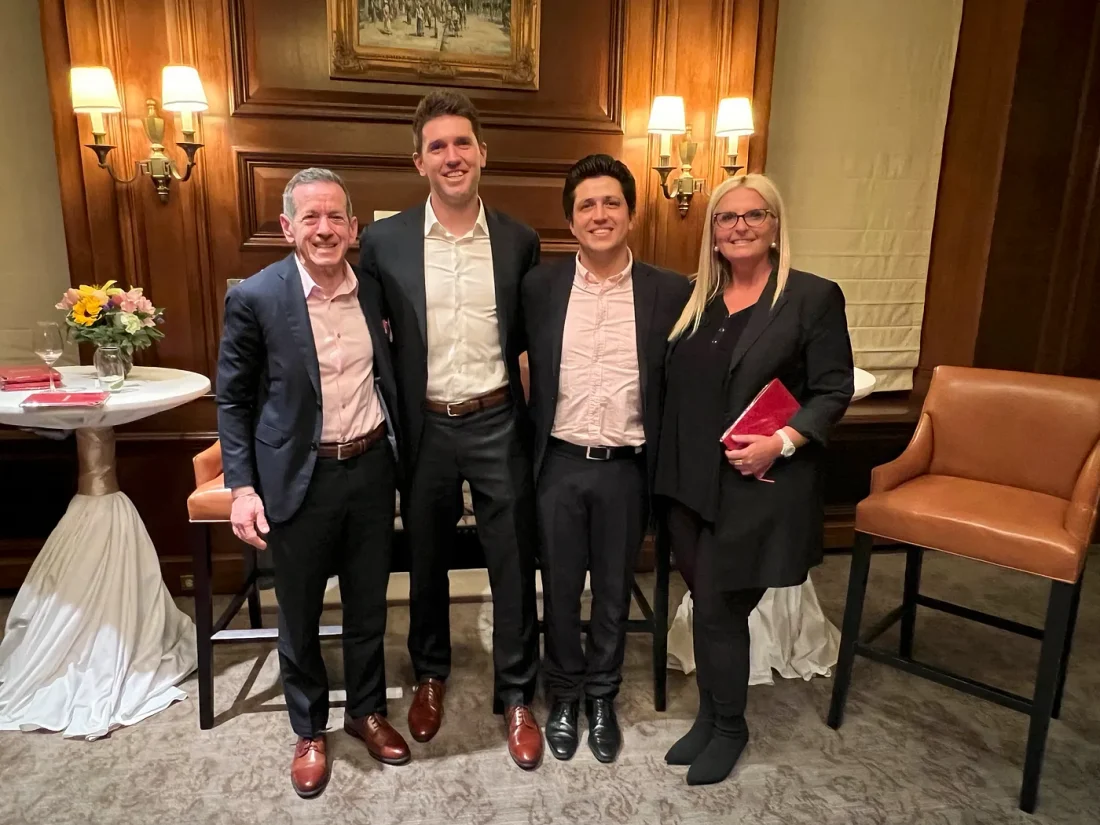As a leader, it’s our job to get outside of our own comfort zone and be intentional with our people.
So many great ideas and conversations came out of our recent event in Chicago. We spoke with leaders across industries who are seeking new ways to engage with and grow their teams in meaningful ways. Multiple themes emerged around building community, starting with the why, active listening, positive intention, and trust. The common link between everything discussed is that as leaders, we must get comfortable with being uncomfortable. Often, the actions that are needed to build a stronger and more engaged team are small steps but they are daunting. They may be simple conversations, questions, or actions that are too often deprioritized. When we find time to add these small Kindnesses into our daily activities, the impact is enormous.
In our latest conversation on ‘Building a Brighter Future of Work’ with leaders from BCG (Kendall LaRue, Partner), dvk (Larry Deutsch, CEO & Co-Founder), and Smithbucklin (Marie-Pierre Huot, Head of Talent Acquisition) common themes emerged.
1. Community
Building community at your workplace takes time. It includes many small steps that add up to a much larger impact across the team. Workplaces that have a strong community are ones where people feel more connected to their colleagues and company. When our people feel that sense of connection and community, they are more motivated to bring their full potential to their work and deliver results.
As Marie-Pierre Huot of Smithbucklin described it, ‘When employees feel that they matter, productivity increases. You need to make time to get to know and create bonds with your employees.’ By taking the time to build those relationships, you are building both short & long-term motivation. It can’t just be about motivating your employee in the short term but rather it’s about how you get to motivation over the longer term. Happy motivated employees improve the overall company performance.
2. Start with the Why
You are likely familiar with Simon Sinek’s ‘Start with Why: How great leaders inspire everyone to take action’. As Larry Deutsch of dvk suggests, this is the most important advice to keep in mind when motivating and inspiring people at the workplace. But it’s more than just the company’s ‘why’. It is equally important, if not more important, to understand each person’s why.
Each person’s why is different. They generally fall across three buckets: (1) Belonging, (2) Safety, and (3) Mattering. Take the time to understand each person’s individual ‘why’. Everyone is different. Leaders often get tripped up by thinking that having a company vision is enough. However, the most important part is understanding the individual and how their individual goals and role aligns into that company vision and purpose.
3. Active listening
To best understand your people’s personal goals and motivations, one of your most important skills as a leader is to listen. And it must be active listening. As a leader, you need to take the time to not only hear the person’s words but to digest them and act on them. Kendall LaRue, Partner at BCG, emphasized that active listening cannot be underestimated as one of the most powerful and important actions needed from leadership. As a leader, we need to understand that just because you see the world one way does not mean that others see it in the same way.
People’s ability to listen is harder than it was 10 years ago. We aren’t sitting next to each other. We’re distracted by our devices. We are trying to cross out our ‘to do’ list. But taking the time to allow people to feel and be heard has exponential results for your business. It demonstrates that you value each person as an individual and it’s the key to unlocking employee motivation.
4. Positive Intent
Going hand in hand with active listening is providing constant feedback delivered with positive intent. As a leader, we need to take the time to digest what our people tell us and then provide opportunities and feedback based on their personal goals. We must give authentic and timely feedback with honest positive intent. We must genuinely care about helping the person grow towards the goals that we have heard.
A great concept that the panel discussed was to always think of feedback as coaching. When we think of ‘feedback’, we often approach the conversation from the perspectives of our own reactions to the person’s work or actions. When we think of ‘coaching’, on the other hand, we think of giving advice and ideas to the person to enhance their skills and capabilities to improve their own performances and impact.
5. Trust
Trust is the foundation to a strong company culture where people are motivated consistently. And trust is a two-way street. Senior leadership needs to have trust in their people that employees can be productive even when they aren’t in the office. Employees need to trust leadership that they are acting on positive intent and purpose. Trust is not something that comes easily between colleagues but rather it is earned over time. Every small action that you prioritize in your daily activities is building (or losing) trust at your workplace.
Overall, the principles of great management have not changed much in the past decades. These themes have always been important at the workplace. But they have gotten increasingly important for leaders who want to grow and motivate their teams to perform at the highest level. And it’s become more and more visible in the hybrid and connected world both when leaders do them well and also when they struggle.
